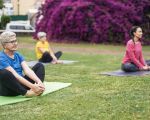Mental Wellness Strategies for Active Lifestyles
As someone who lives a fast-paced, active lifestyle, I’ve always known the importance of staying physically fit. However, it wasn’t until I started feeling mentally overwhelmed that I realized that physical wellness and mental wellness are deeply intertwined. In my experience, one of the best ways to keep your mind and body in harmony is to develop a set of mental wellness strategies tailored to an active lifestyle. These strategies have helped me not only improve my overall well-being but also increase my productivity and happiness. Here’s what I’ve learned and what has worked for me—strategies to help maintain mental wellness for those who lead an active life.
1. Prioritize Mindfulness in Your Daily Routine
Mindfulness has become one of my go-to strategies for mental clarity, especially during busy or stressful times. In an active lifestyle, there’s often so much going on—between workouts, work commitments, social gatherings, and other activities—that it’s easy to feel mentally scattered. That’s where mindfulness comes in. By taking just 5-10 minutes each morning to practice mindfulness, I’ve been able to calm my mind and set a positive tone for the rest of the day.
Mindfulness can take many forms—whether it’s focusing on your breath, meditating, or even going for a mindful walk. The goal is to be fully present in the moment, letting go of worries or distractions. This practice has significantly reduced my stress levels, helped me stay grounded, and increased my overall sense of mental well-being. If you haven’t tried mindfulness yet, I highly recommend incorporating it into your daily routine. Even just a few minutes a day can make a significant difference.
2. Fuel Your Body with Nutritious Food for Mental Clarity
When you lead an active lifestyle, what you put into your body plays a crucial role not only in your physical performance but also in your mental wellness. I noticed that after making healthier food choices, I experienced less brain fog and felt more energized throughout the day. In particular, I focused on including brain-boosting foods such as omega-3-rich fish, leafy greens, nuts, and seeds.
In addition to eating nutrient-dense foods, I also made sure to stay hydrated. Dehydration can affect mental clarity and focus, which can lead to stress and anxiety. I found that maintaining a balance of hydration and proper nutrition improved my mood, made it easier to concentrate, and helped me maintain my energy levels during workouts and throughout the day.
3. Incorporate Regular Exercise to Boost Mental Health
As someone who regularly exercises, I can attest to the power of physical activity in promoting mental wellness. It’s no secret that exercise releases endorphins, the “feel-good” hormones that help alleviate stress and boost mood. But it wasn’t until I integrated a variety of workouts into my routine that I truly began to see the mental health benefits.
For example, after a stressful week, I often turn to yoga and stretching to relieve tension and quiet my mind. On the other hand, after a long workday, going for a run or engaging in a high-intensity interval training (HIIT) workout helps me release pent-up energy and anxiety. It’s important to experiment with different types of exercise to see what works best for your mental state. Exercise not only improves physical health but can also be a highly effective way to support mental wellness.
4. Get Enough Sleep to Recharge Your Mind and Body
When I first adopted a more active lifestyle, I underestimated how critical sleep was for my overall wellness. I used to think that as long as I was active during the day, my body would naturally be tired enough to sleep well. However, I quickly learned that getting adequate, restful sleep is essential for both mental and physical recovery. Without enough sleep, I found myself feeling irritable, stressed, and less focused during the day.
I made a conscious effort to prioritize sleep and ensure that I was getting 7-9 hours of rest each night. I created a bedtime routine that included winding down without screens, using calming scents like lavender, and ensuring my bedroom was cool and dark. By prioritizing sleep, I noticed a significant improvement in my energy levels, my ability to manage stress, and my ability to stay focused throughout the day. If you’re not getting enough sleep, it’s one of the best changes you can make to improve your mental wellness.
5. Set Realistic Goals and Celebrate Small Wins
One of the most rewarding aspects of living an active lifestyle is seeing the progress you make, whether it’s in fitness, work, or personal growth. However, it’s easy to get caught up in the “big picture” and feel overwhelmed by long-term goals. I learned that setting small, achievable goals and celebrating each milestone helped reduce stress and increased my motivation.
For example, if my goal was to run a 5K, I broke it down into smaller steps—starting with running shorter distances and gradually building up my endurance. Each time I reached one of those smaller goals, I celebrated my progress. This approach helped me maintain a sense of accomplishment, rather than feeling discouraged by the larger goal. By focusing on small wins and celebrating them, I’ve been able to maintain my motivation and keep my mental health in check.
6. Practice Self-Care and Take Time for Yourself
When you’re always on the go, it’s easy to forget the importance of self-care. In an active lifestyle, you’re constantly balancing multiple tasks, but I’ve learned that it’s crucial to take time for yourself. Whether it’s indulging in a relaxing bath, reading a good book, or simply sitting in silence, these moments of self-care are vital for mental rejuvenation.
For me, self-care also means disconnecting from technology and spending time in nature. Taking a walk in the park, going for a hike, or simply sitting by the water helps me recharge mentally and emotionally. Even though it’s hard to slow down, I remind myself that taking these moments of rest allows me to be more productive and engaged in my daily activities. Self-care is not a luxury, it’s a necessity for maintaining mental wellness in an active lifestyle.
Conclusion
As someone who lives an active lifestyle, I’ve learned that mental wellness is just as important as physical health. By incorporating strategies such as mindfulness, nutritious food choices, regular exercise, proper sleep, setting realistic goals, and practicing self-care, I’ve been able to support my mental health and thrive in all areas of life. If you’re looking for ways to balance mental wellness with an active lifestyle, I encourage you to try out some of these strategies. You’ll not only feel better but also achieve greater success in your personal and professional life.








